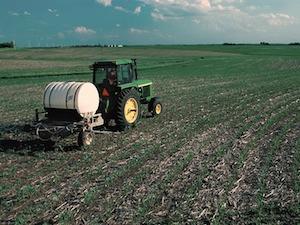How manure can save humanity
Image of a farmer using fertilizer
This story was originally covered by PRI’s Here and Now. For more, listen to the audio above.
“We once had a virtuous cycle: Grazing animals, letting them fertilize the land,” Ohio farmer Gene Logsdon told PRI’s Here and Now. People once valued manure — in fact, wars were once fought over bat droppings. Now we cram animals into small spaces and cart the product off as “waste.”
That process may be changing back to value traditional manure, as the price of chemical fertilizers continues to go up. “We must have fertilizer to put on the land to grow more crops,” Logsdon says. He writes in the book “Holy Shit, Managing Manure to Save Mankind” that manure may become a more valuable product than much of what is currently produced on farms.
One of the problems facing farms today is that “animals are all kept in barns that are too small, so the manure builds up quickly,” according to Logsdon. People don’t know what to do with it. And the chemical fertilizers that farmers use instead may actually be hurting the land they’re fertilizing. Logsdon says they’re “lessening the amount of organic matter in the soil, and manure puts it back in.”
People need to figure out a way to use the waste created by animals, according to Logsdon, including pets and humans. He cites a statistic that says LA is dumping to 235 million gallons of primary treated effluent and 100 million gallons of secondary effluent every day into the ocean.
There’s still a cultural norm that says waste is dangerous, but Logsdon believes that’s all in the way it’s treated. He acknowledges that there are parasites in waste, but “if you put the manure in a composted pile, allow it to age for a year, almost everything is gone,” he says. “Allow it to age for two years, and really it’s as safe as anything you can put on the garden.”
The smell also throws some people off. “Fresh manure has an odor,” Logsdon says. “Composted manure, the longer it composts, it becomes a very earthy and kind of a nice smell. But it takes a little time to do that.”
More expensive chemical fertilizer may force the American agricultural system back toward more small farms, according to Logdson. ” If fertilizer becomes really really valuable, it will almost force farmers to go back to mixed grain and livestock farming,” he says. “Where the family farm will come out ahead on that is because relying on manure does almost demand that the farm be… distributed. More of them scattered out over the land, which almost by definition means that they’re smaller.”
Much of the hesitancy comes from the cultural norms. “I don’t know how to convince people that manure is not as bad a thing as they’ve been taught it is,” Logdson says. ” If manure was white and smelled like roses, we wouldn’t have a problem. That’s what I think.”
———————————————————————————
“Here and Now” is an essential midday news magazine for those who want the latest news and expanded conversation on today’s hot-button topics: public affairs, foreign policy, science and technology, the arts and more. More “Here and Now”.
